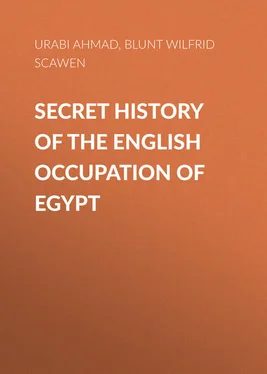Wilfrid Blunt - Secret History of the English Occupation of Egypt
Здесь есть возможность читать онлайн «Wilfrid Blunt - Secret History of the English Occupation of Egypt» — ознакомительный отрывок электронной книги совершенно бесплатно, а после прочтения отрывка купить полную версию. В некоторых случаях можно слушать аудио, скачать через торрент в формате fb2 и присутствует краткое содержание. Жанр: foreign_antique, foreign_prose, Историческая проза, на английском языке. Описание произведения, (предисловие) а так же отзывы посетителей доступны на портале библиотеки ЛибКат.
- Название:Secret History of the English Occupation of Egypt
- Автор:
- Жанр:
- Год:неизвестен
- ISBN:нет данных
- Рейтинг книги:4 / 5. Голосов: 1
-
Избранное:Добавить в избранное
- Отзывы:
-
Ваша оценка:
- 80
- 1
- 2
- 3
- 4
- 5
Secret History of the English Occupation of Egypt: краткое содержание, описание и аннотация
Предлагаем к чтению аннотацию, описание, краткое содержание или предисловие (зависит от того, что написал сам автор книги «Secret History of the English Occupation of Egypt»). Если вы не нашли необходимую информацию о книге — напишите в комментариях, мы постараемся отыскать её.
Secret History of the English Occupation of Egypt — читать онлайн ознакомительный отрывок
Ниже представлен текст книги, разбитый по страницам. Система сохранения места последней прочитанной страницы, позволяет с удобством читать онлайн бесплатно книгу «Secret History of the English Occupation of Egypt», без необходимости каждый раз заново искать на чём Вы остановились. Поставьте закладку, и сможете в любой момент перейти на страницу, на которой закончили чтение.
Интервал:
Закладка:
My last recollection that winter at Cairo is of a barbaric banquet offered by the Khedive to Mr. Cave and the members of his commission, to which I was by accident invited. It was given in the Viceregal Kiosque at the Pyramids, and was one of those extravagant entertainments Ismaïl was accustomed to dazzle European eyes with, nor was there anything wanting to point the contrast between the wealth of the entertainer and the poverty of those at whose expense it was really given. The table was spread for us literally under the eyes of a starving multitude of peasants, the very peasants Mr. Cave was there to save from ruin. Yet none of us seemed to feel the incongruity of it all. We feasted elaborately, and drank champagne of the best, and went our way, and it is only now that, with a better knowledge of the whole circumstances, I recall the real character of the scene and recognize it for what it in all verity was with its waste and surrounding misery, a true presentment of the twin causes of the coming revolution.
CHAPTER II
SIR RIVERS WILSON'S MISSION
On leaving Cairo that spring of 1876 we paid our first visit to the confines of Arabia. It was then more the custom with European tourists than it is now to go on from Egypt into Syria by way of the desert, and we took once more to our camels and our tent life, and with the same Bedouins who had escorted us from Suez, crossed the Suez Canal and made a long tour through the Sinai peninsula and on by Akabah to Jerusalem. As we were strange to the country we passed through, and were still very ignorant of Arabic and had with us no dragoman, we got into some rather perilous adventures which are now amusing to recollect, though at the time they were disagreeable enough. It is perhaps worth recording as a curious accident of travel that as we were passing along the shore of the Gulf of Akabah, which is fringed in places with coral reefs, we had stopped to examine these and to admire the wonderful colours, purple, gold, and vermilion, of the innumerable little fishes which live in them. I was standing thus at the sea's edge, my gun, which I always then carried, in my hand, when I saw a great commotion in the water near me and suddenly, before I was well aware of the cause, a large shark, one of a shoal, leaving the rest came straight to where I stood and was already within a few yards of me before I understood what manner of fish it was or that I was the object of its attack. I had barely time to raise my gun when it turned, as these fishes do, on its side and rose half out of the water to take hold of me, and it was so near me when I fired that my charge of small shot killed it without the need of a second barrel, so that we were able, with the help of a lasso, to bring it high and dry on shore. It was a very large one, nearly ten feet long, and I do not doubt that if I had been a little more careless than I was I might have been carried from the rock into the sea by it. The incident brought home to me the danger which was once so common in Egypt for the fellahin from crocodiles in the Upper Nile, and I have been cautious in the matter of sea bathing ever since.
We fell into trouble, too, with certain Arabs on our way, through our ignorance of the rules and customs of the desert. When camped outside Akabah, we received a visit from Abunjad the well-known Sheykh of the Alawin, a branch of the Howeytat tribe, who had the customary right of escorting travellers to Petra, and whom we managed to offend, with the result that we ended by starting without escort or guides, our only native companions being two Arab boys who had followed us from Mount Sinai, and knew nothing of the northern country. With these we ventured north for Palestine, and presently ran short of water. The wells, when we by fortune found them, proved to be almost dry, and it was only after great hardships under a burning sun that we at last reached an Arab encampment. Things had become so bad for us one night that we had resolved that if at noon on the following day we should have still failed to find water we must abandon our baggage and push on on our best camels for our bare lives to the settled country. An hour, however, before the time agreed on, the happy sound of an ass braying told us that a camp must be near, and presently we spied an Arab child perched on a mound, and from him, under some compulsion of fear, got knowledge of their watering place. It was a beautiful pool of rain water in the hollow of a rock, and here we lay long and quenched our thirst and filled our goat skins. By good fortune it was, the men of the place, Azazimeh Arabs, were away or I doubt if we should have been allowed to take so liberal a share of this "Bounty of God," for they were in possession of the place and had sown a little barley field, as Bedouins often do on the Syrian frontier for the chance of rain, and this was all their drinking store till their corn should be ripe. Nor were they otherwise than justly angry on their return, and we had to watch all night for fear of an attack. It was not till morning that they came with shouts and menaces, but we had already loaded our camels, and being well armed held on our way. Knowing the ways of Bedouins better now, I feel sure that we need not thus have quarrelled with them, and that with a little explanation and payment for our disturbance of their rights they would have received us well. But as it was, we were within a hair's breadth of a serious misadventure, and deserve to be thankful that the following day we at last reached the grass lands between Hebron and Gaza. Here the more settled Arabs gave us a good reception, and having made friends with them the memory of our past danger was soon forgotten. This ended our travels for that year, and from Jerusalem we returned in the early summer by the ordinary sea route to England.
The winter of 1877-8 saw us again in the East, this time with a larger program of adventure. We visited Aleppo, and passed down the Euphrates to Bagdad, and on our return journey made acquaintance with the great Bedouin tribes of Mesopotamia and the Syrian Desert south of Palmyra. We began now to know something of the language, and to understand the customs of the Arabs, and made no more mistakes of the kind I have just described. For this we were largely indebted to the wise counsels of the then English Consul at Aleppo, Mr. Skene, who had had a large experience of Bedouins and their ways, and who taught us to approach them on their nobler side, and putting aside all fear to trust them as friends, appealing to their law of hospitality. The history of this most interesting and successful journey has been very fully written by my wife in her "Bedouin Tribes of the Euphrates," in reality a joint work, in which my first political views in regard to Arabian liberty may be traced by those who care to seek them. My sympathy with the Arabs as against the Turks, with whom they were at chronic war, was the result of no pre-conceived idea, and still less of any political plan, but was caused by what I saw, the extreme misgovernment of the settled districts by the Ottoman officials, and the happiness of the still independent tribes. It was a time of much local disorganization. The Russo-Turkish war was in its last desperate throes at Kars and Plevna, and though our good wishes were all with the Moslem armies as against the invading Muscovites, the sight of the miserable Syrian and Mesopotamian villagers being driven in chains as recruits to the sea coast moved us to anger against the imperial government, an anger which the hatred everywhere manifested by the Arabs against the Turks daily intensified. It was impossible in those days of far worse rule than now for any one with the instinct of liberty to do otherwise than resent the Ottoman misgovernment of its Arabic-speaking provinces. It was a government of force and fraud, corrupt and corrupting to the last degree, where every evil engine was employed to enslave and degrade the people, where the Moslems were worse treated than the Christians, and where all alike were pillaged by the Pashas. The Turk in his own home in Asia Minor has a number of honest and manly virtues, but as a master in a subject land he is too often a rapacious tyrant. Every vilayet had been bought with money at Constantinople, and the purchasing Valy was making what fortune he could during his term of office out of those he was given to administer. The land of Bagdad, under Ottoman rule, we had seen turned into a wilderness, Damascus into a decaying city. Everywhere land was falling out of cultivation, and the Government, like a moral plague, was infecting the inhabitants with its own corruption. Can it be wondered at if, in view of these doings, we thought and spoke strongly, and, though our Government at the time was in open alliance with the Porte, our sympathies were with any scheme which might make the Arabian provinces independent of the Empire?
Читать дальшеИнтервал:
Закладка:
Похожие книги на «Secret History of the English Occupation of Egypt»
Представляем Вашему вниманию похожие книги на «Secret History of the English Occupation of Egypt» списком для выбора. Мы отобрали схожую по названию и смыслу литературу в надежде предоставить читателям больше вариантов отыскать новые, интересные, ещё непрочитанные произведения.
Обсуждение, отзывы о книге «Secret History of the English Occupation of Egypt» и просто собственные мнения читателей. Оставьте ваши комментарии, напишите, что Вы думаете о произведении, его смысле или главных героях. Укажите что конкретно понравилось, а что нет, и почему Вы так считаете.












